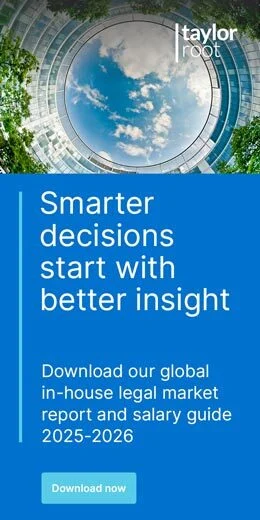How a non-linear path can lead to a rewarding legal career
In a profession that often encourages following a well-established path, one senior lawyer’s career trajectory demonstrates the value of trusting your instincts, embracing risk, and seeing each move as a stepping stone. For legal leaders contemplating a shift—whether in-house or back to private practice—his story is a timely reminder that careers don’t need to be linear to be successful.
Choosing in-house from day one
While most newly qualified lawyers start their careers in private practice, Richard Aitchison took a different route—one shaped in part by timing, but ultimately driven by an appetite for deeper involvement in business operations.

“I qualified in 2009 at the tail end of the financial crisis, and at that point, there weren’t many NQ positions available in private practice,” he explains. “So I decided to give myself the best chance of finding a suitable role by exploring both private practice and in-house positions.”
This versatility led him to a role at National Australia Bank’s UK legal team—a move that proved pivotal.
“I was particularly grateful for receiving a greater level of responsibility than perhaps you may typically get as an NQ solicitor in private practice,” he says.
The early experience helped shape his commercial perspective and introduced him to the unique value legal professionals can bring when embedded within a business.
For those exploring the transition from private practice into in-house, Richard’s journey aligns with advice many lawyers receive about identifying the right moment to make the move. Navigating the shift successfully can set the tone for long-term growth.
A return to private practice—by opportunity, not design
After spending several years in-house across various financial services organisations, Richard returned to private practice—though not as a result of a deliberate plan. “I hadn’t actively pursued a move back into private practice, but the opportunity to join the FinTech practice at Deloitte Legal emerged, and I was really excited by it,” he says.
The role allowed him to build his technical skills while continuing to work with a diverse client base. “It offered the chance to sharpen my legal skills and work with a wide range of high-calibre clients, as well as collaborate with different service line teams within one of the Big Four consulting firms.”
This hybrid environment gave him the best of both worlds: exposure to strategic advisory work, and the chance to think more broadly about how legal teams operate across different sectors.
Richard’s experience is proof that the shift from in-house back to private practice can be both feasible and fulfilling, particularly when lawyers bring commercial insight and stakeholder fluency to the table.
Why in-house still holds long-term appeal
Now, he is considering a move back in-house—drawn not by dissatisfaction with private practice, but by the distinct opportunities that an internal role provides. “Working in private practice has undoubtedly helped to hone my legal skills and I have really enjoyed working with a wide variety of businesses from start-ups and scale-ups to large corporates and financial institutions,” he reflects.
However, the appeal of being deeply embedded in a business, from problem to solution, remains powerful. “I particularly enjoy working in-house because you’re able to help businesses solve their biggest challenges and work on projects from start to finish,” he explains. “You need good communication skills, commercial insight, and the ability to work flexibly with a wide range of teams.”
It’s this cross-functional, long-term impact that continues to draw many experienced lawyers back to the in-house environment. For lawyers weighing their next step, making the most of your in-house career involves focusing on influence, not just technical expertise.
Redefining success and going against the grain
Legal careers are increasingly varied, but in the early stages, the pressure to stick to a predefined route can be intense. Richard recalls being an outlier when he first moved in-house.
“I was definitely in the minority by moving in-house straight after qualifying,” he says. “There was an element of going against the grain, but I really believe it was the right move.”
He believes this early divergence gave him a unique blend of insight that has benefited him throughout his career. “The experience I acquired in that role and the rest of my career in-house and private practice has been invaluable and helped me to deliver the legal, commercial and practical advice that early-stage and established businesses require.”
Taking risks, staying resilient
As many GCs know, the path to senior legal leadership is rarely straightforward. Richard Aitchison says embracing uncertainty has made him a stronger lawyer and leader. “You need to be resilient—your career may not follow a linear path (and that applies in all professions, not just the legal profession),” he says.
He adds that a willingness to take calculated risks is crucial: “Sometimes you need to take some calculated risks to pursue your career objectives and overcome any obstacles that might be in the way.” Importantly, he emphasises the value of lifelong learning:
“It’s important to retain a growth mindset throughout your career and be alive to all of the opportunities to learn, grow and develop as a lawyer and a leader.”
For lawyers curious about exploring different industries, developing that growth mindset can include facilitating a sector switch—a challenge that requires reflection, curiosity, and preparation.
No wrong turns—only next steps
When asked what advice he would offer to junior lawyers weighing their next move, Richard is clear that there’s no single path to success. “The legal profession is evolving rapidly and there is no ‘one size fits all’ approach to navigate your career,” he says. “Don’t worry about any perceived or actual pressure to pursue a particular path. Take your time to choose the right role for you—whether that’s private practice or in-house.”
And if you change your mind? “Nothing is set in stone, and so if you decide that you want to move back into private practice from in-house, you can absolutely do that. The skills, experience and connections you have developed in-house will definitely serve you well as a private practice lawyer and vice versa.”
The profession is catching up
While not all firms have embraced flexible career paths, the broader legal industry is starting to shift, thanks in part to changing client demands and evolving legal delivery models. “Yes, I think the profession is becoming more fluid in terms of career paths and more generally—especially with the prevalence of AI and its impact on the provision of legal services,” he says.
He also sees growing recognition of the strategic value in-house experience brings. “Many law firms and alternative legal service providers are spending a lot of time trying to understand what GCs and in-house legal teams really want from their external lawyers. In my view, one of the best ways to do that is to tap into the experience of lawyers that have worked in-house.”
For private practice lawyers, gaining this understanding is more important than ever: “I’d encourage more lawyers to spend time in-house and take the time to really understand how businesses operate, how they make money, and how legal services can best be tailored to help businesses scale and meet their objectives.”
Career clarity comes from experience—not a master plan
Fulfilment and purpose have been key drivers throughout his career—and he encourages others to take the time to reflect before making their next move.
“Take the time to weigh up the pros and cons of your next move before deciding,” he says. “I also find it really helpful to discuss it with friends, family, mentors etc as you may get a different perspective or view that you haven’t thought of.”
He cautions against being swayed too heavily by external expectations. “Don’t be too concerned with external perceptions and expectations—only you will know whether you have made the right move. If it doesn’t work out as well as you’d hoped, move on and learn from it. You typically learn more about yourself in adversity—the key thing is to make sure you use it as a building block to even bigger and better things.”
Success on your own terms
So what does success look like to him now?
Like many GC’s, his definition has evolved. It’s no longer about title or status, but about impact, growth, and the ability to lead with authenticity. As Richard looks to the next chapter in his legal journey, he does so with confidence, clarity, and a deep belief in the value of a flexible mindset.




